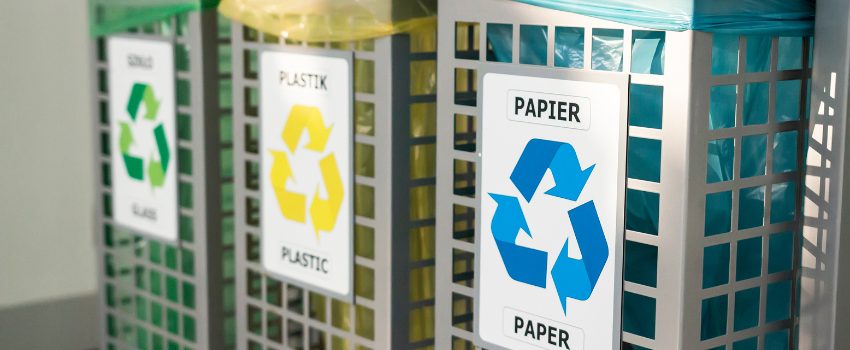Managing Waste in the Workplace – A Comprehensive Guide
Waste management and recycling is a crucial aspect of maintaining a clean and sustainable workplace. Effective waste management not only helps reduce your organisation’s environmental footprint but also promotes a healthier and more productive workspace. In this blog we’ll explore various waste streams that commonly arise in offices, such as kitchen waste, office paperwork, electrical waste, hygiene waste, work clothing, and clinical waste. We’ll discuss best practices for managing these waste streams efficiently and responsibly, including options for secure shredding and disposal methods.
1. Kitchen Waste
The office kitchen can generate a significant amount of waste, primarily consisting of food scraps, beverage containers and packaging materials. To manage kitchen waste effectively:
– Implement a recycling program: Encourage employees to separate recyclables from general waste. Provide clearly labelled bins for paper, plastic, glass, and aluminium items.
– Regular maintenance: Ensure that kitchen waste bins are emptied regularly to prevent odours and pests.
– Composting: If possible, set up a composting system for food scraps and coffee grounds. Composting not only reduces waste but also creates nutrient-rich soil for landscaping.
– Coffee pods: Speak to your supplier about recycling schemes for your used coffee pods, typically companies will send you recycling bags to place your pods in and your send these back to their nominated recyling partner.
2. Office Paperwork
Paper waste is a common issue in many offices, especially if your organisation deals with sensitive documents. To manage office paperwork efficiently:
– Secure shredding: Protect sensitive information by using professional shredding services. You can choose between onsite or offsite shredding based on your organisation’s size, available resources and security needs.
– Digitalisation: Encourage the digitalisation of documents to reduce the reliance on paper and make information more accessible which in turn will reduce your waste in this area.
– Recycling: Always recycle paper when possible, promoting a sustainable approach to waste management and ensure your recycling partner shares with you your “certificate of destruction”.
3. Electrical Waste
You may have heard the terem WEEE which stands for Waste, Electrical and Electronic Equipment and is regulated by the UK Government to reduce the amount of unwanted electrcials that are incerated or sent to landfill. Why not colalte all your old computers, printers, cables and other electronic devices to get them ready to recycle responsibly due to their potentially hazardous components. Here’s how to handle it:
– Electrical waste recycling programs: Seek a supplier who can provide WEEE recycling facilities to dispose of old electronic equipment properly and they will share a waste transfer certificate.
– Reuse and refurbish: Consider reusing or refurbishing older electronics if they are still functional like mobile phones.
– Educate employees: Train your staff about the importance of responsible electrical waste disposal and the potential environmental impacts of improper disposal.
4. Hygiene Waste
Hygiene waste, such as used tissues and sanitary products, can be a challenge to manage in the workplace but you can use professional companies to remove this waste. To maintain hygiene and cleanliness:
– Separate bins: Provide separate bins for hygiene waste in restrooms and other relevant areas including PPE.
– Hygiene waste disposal services: Partner with waste management companies that specialise in the disposal of hygiene waste to ensure proper handling and disposal. Some companies will also be able to turn your waste into energy and ensure it doesn’t go to landfill.
– Regular cleaning and maintenance: Ensure that hygiene waste bins are cleaned and emptied frequently to maintain a sanitary environment and request this is done at a time to suit your business and when customers may be onsite.
5. Work Clothing
Work clothing waste can accumulate in offices where uniforms or specialised clothing are worn. To manage this waste stream:
– Donation programs: Consider donating old work clothing that is still in good condition to charitable organisations or local community groups.
– Recycling textiles: Reach out to specialised textiles recycling providers who can take your unwanted clothing, textiles and workwear that is no longer required and recycle this reponsibly.
– Promote durability: Encourage employees to take good care of their work clothing, which can extend its lifespan and reduce the need for replacements and seek to buy clothing which can be recycled at the end of its life.
6. Clinical Waste
In some workplaces, especially medical and healthcare facilities, clinical waste can be a concern. To manage clinical waste safely:
– Segregation and labelling: Clearly segregate clinical waste from other waste streams and label it appropriately.
– Medical waste disposal services: Work with specialised clinical waste disposal companies that can ensure safe and compliant disposal.
– Training and awareness: Train employees on the correct procedures for handling and disposing of clinical waste to prevent contamination and ensure safety.
Effective waste management in the workplace is essential for environmental sustainability, employee wellbeing and safety. By implementing responsible waste management practices for various waste streams, including kitchen waste, office paperwork, electrical waste, hygiene waste, work clothing, and clinical waste, your organisation can create a cleaner, more efficient, and environmentally friendly workspace. Make waste management a priority in your workplace, and you’ll reap the benefits of a healthier and more sustainable office environment.









